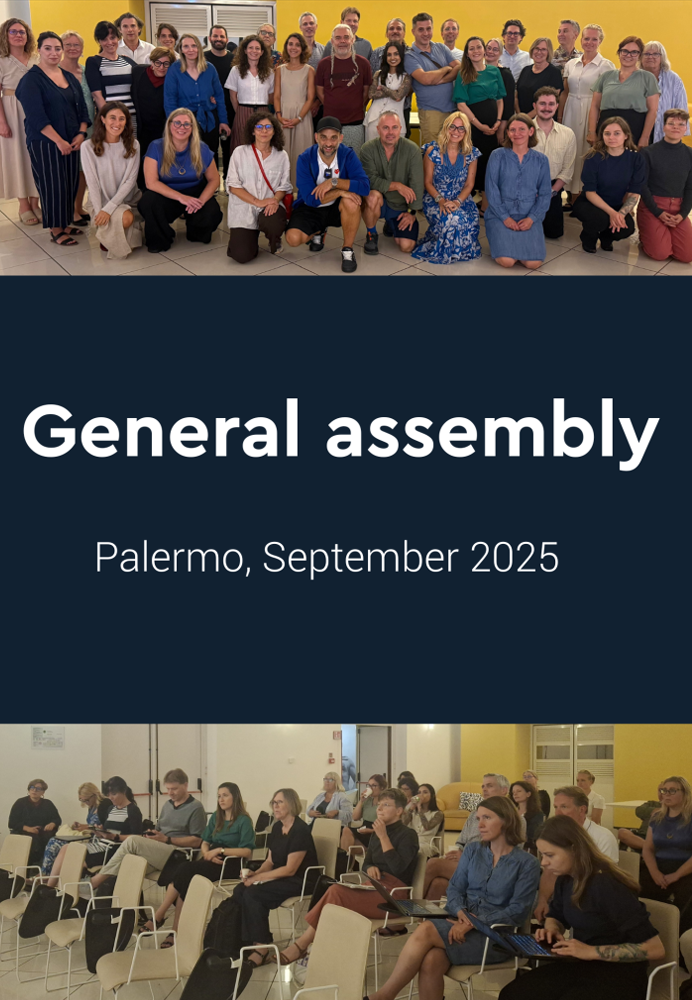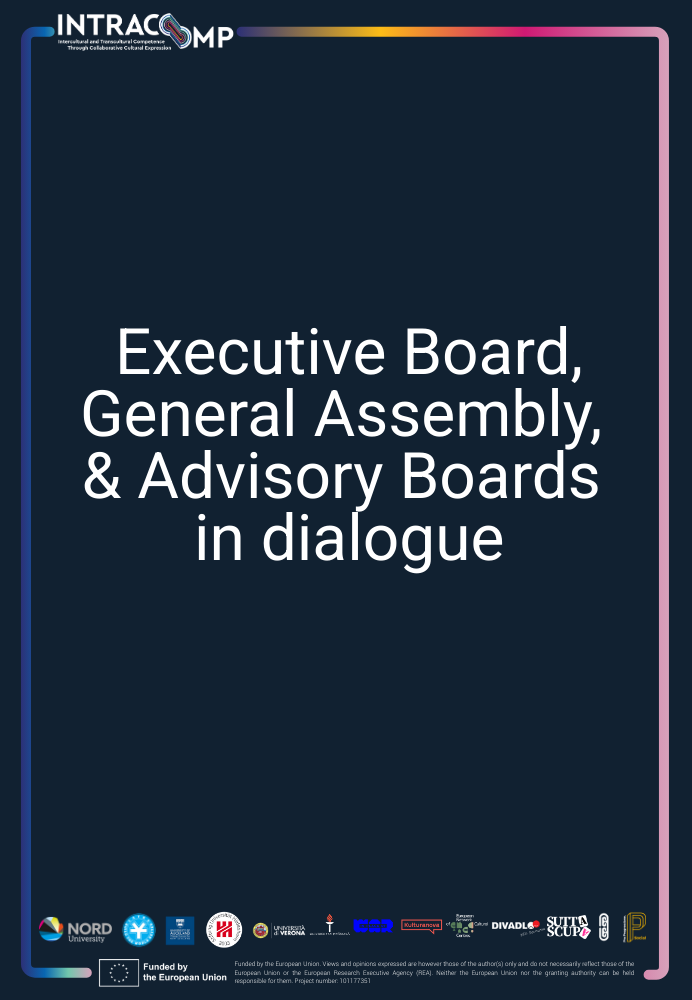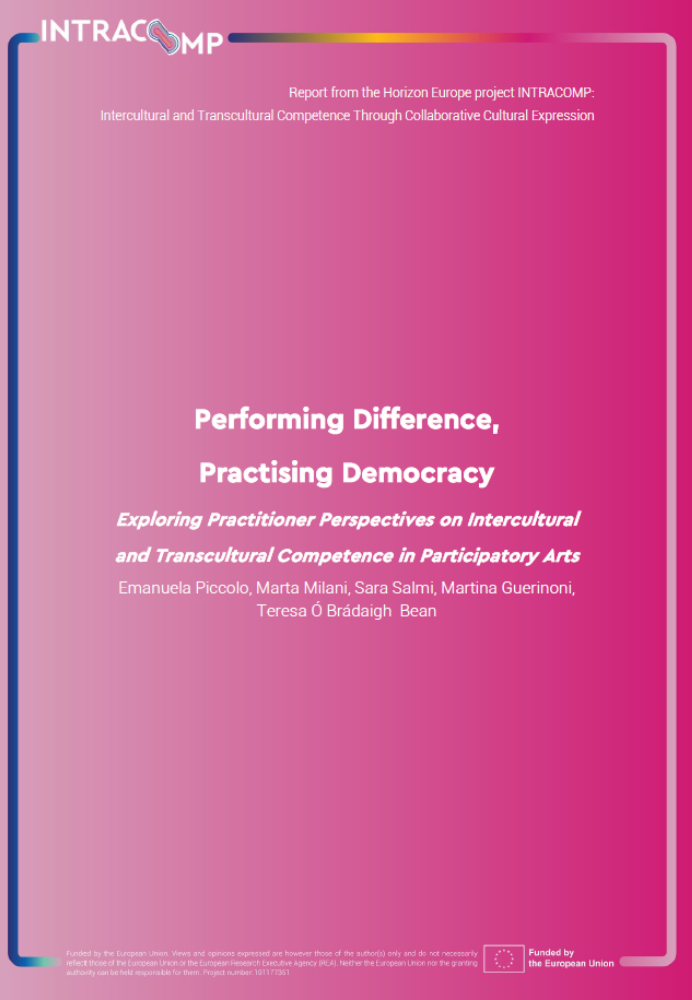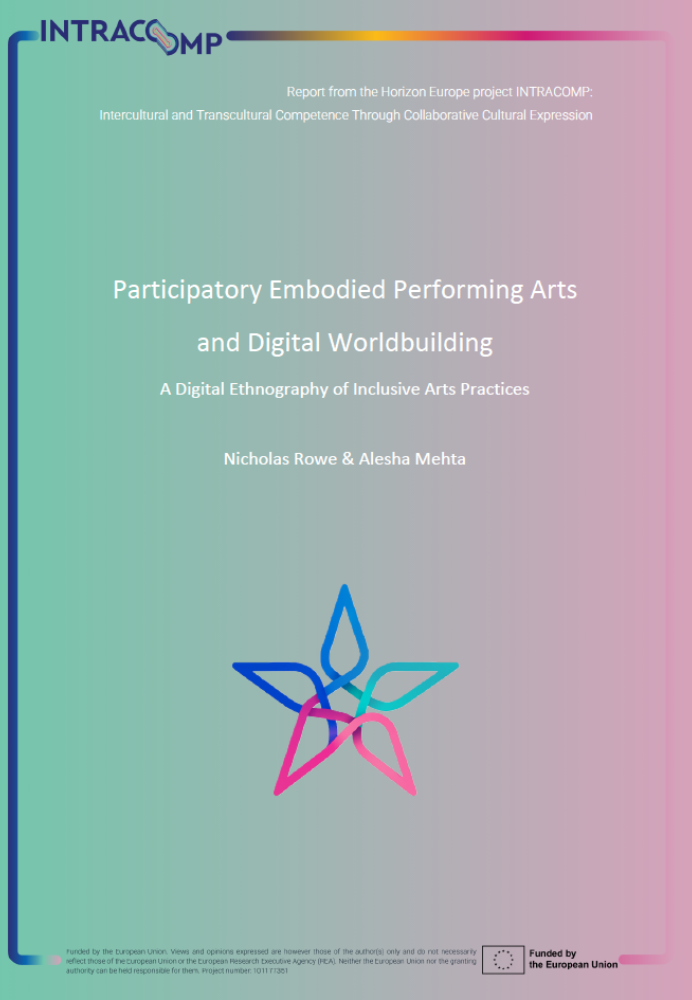INTRACOMP General Assembly in Palermo: Two days of dialogue, creativity, and future planning
On 9–10 September 2025, partners of the INTRACOMP consortium gathered in Palermo, Italy, for the annual General Assembly. Against the backdrop of the city’s vibrant cultural district, the two-day meeting brought together researchers, educators, artists, and cultural practitioners from across Europe.
It was more than a meeting — it was a celebration of progress, a space for reflection, and a laboratory for new ideas.
Day 1 – Setting the stage
The Assembly opened with an ice-breaking session, led by the Associate Professor Runa Hestad Jenssen, setting a collaborative tone and reminding everyone that INTRACOMP is, above all, about connection.
This spirit carried into the Opening Session, where the Dean of the Faculty of Education, Arts and Culture at Nord University, Professor Rose Martin, welcomed everyone, and Professor Nicholas Rowe and Hanne Silje Hauge provided an overview of the General Assembly, situating the discussions within the broader trajectory of the project.
Status quo: WP leaders’ reports
Each Work Package leader presented updates on progress, challenges, and opportunities. From policy and research to digital innovation and communication, the reports highlighted both achievements and the road ahead. The consortium left with a shared sense of direction — and a recognition of the hard work already accomplished.
Advisory Board: First commentary
One of the most anticipated moments of the morning was the introduction of the Expert Advisory Board (meet them here).
In Palermo, Farah Wardani and Michael Ahlers joined in person, while Fred Dervin and Tommi Laitio contributed via video messages. Each brought fresh insights — from cultural policy and pedagogy to intercultural dialogue — enriching the consortium’s perspectives and encouraging reflection on its impact.
Financial transparency & the year ahead
Financial Officer Paulina Zvezdova and Project Manager Hanne Silje Hauge presented the financial report, confirming that the consortium is on solid ground. Following this, the GA endorsed key deliverables (D1.1, D7.1, D7.2, D8.1, D8.2) and milestones (M1 and M2).
The morning closed with a forward-looking session: a roadmap of milestones, deliverables, opportunities, and challenges. The next General Assembly was announced for March 2026.
Workshops: Transculturalism & Competence Frameworks
The afternoon shifted into workshops:
- Transculturalism, facilitated by Professor Nicholas Rowe (Nord University) and Associate Professor Marta Milani (University of Verona), invited participants to explore cultural democracy, transculturalism, and transensus. Through dialogue and group activities, they examined how cultural encounters create shared meaning without erasing difference.
- Competence Frameworks, led by Dr. Hamish McIntosh (Nord University), mapped the skills and competences that underpin collaboration. Participants reflected on frameworks for cultural work and considered how these can be strengthened within and beyond the consortium.
CDE plan: Zines as Tools for Reflection
The day ended with creativity: LATRA introduced zine-making as a playful, hands-on format for communication, dissemination, and self-reflection. Participants explored how zines can democratize knowledge-sharing, offering space for alternative voices and DIY expression.
Cultural evening: Moltivolti & Rakija Bomba Trio
No Palermo meeting would be complete without cultural immersion. The consortium gathered at Moltivolti, a multicultural social enterprise, for the Gala Dinner. A presentation on the enterprise’s mission was followed by food, conversation, and live music by the Rakija Bomba Trio.
Day 2 – From Capabilities to Policies
The second day began with reflections on Day 1, gathering impressions and takeaways.
Workshops: Capability Building & Digital Interactions
The morning featured two hands-on workshops:
- Capability Building, facilitated by Dr. Hamish McIntosh (Nord University) and Ingrid Danckaerts (European Network of Cultural Centres), explored mentoring, professional development, and organisational ecosystems. Participants brainstormed ways to strengthen capacities across sectors.
- Digital Interactions, led by Dr. Burkhard Wünsche (University of Auckland), used storyboarding exercises to imagine how AR, VR, and digital tools can transform storytelling and intercultural engagement.
Workshop: Policy Mapping
In the afternoon, Prof. Dr. Julius Heinicke, Holder of the UNESCO Chair in Cultural Policy at the University of Hildesheim, and Lea Frauenknecht, Academic Associate, guided participants through policy mapping. Stakeholders, key documents, and potential roles were identified, helping the consortium envision how INTRACOMP can strategically influence the policy landscape.
Connecting with Sister Projects
The GA also spotlighted other Horizon Europe Transformations projects:
- ALPHABETICA – opening access to arts-based education for children and young people at risk of exclusion through 12 pilots in 8 countries.
- PULSE-ART – enhancing cultural awareness and expression by integrating the arts into education, developing competence frameworks and professional development tools.
- TOWCHED – placing heritage collections at the heart of inclusive lifelong learning, connecting education with the SDGs.
- D@rts – bridging creativity and technology to reimagine classrooms through digital and artistic tools.
Together, these projects form a vibrant ecosystem, sharing knowledge and amplifying impact across Europe.
Advisory Board: Second commentary
The Advisory Board returned with further reflections, offering valuable feedback and encouragement, while posing critical questions for the consortium to carry forward.
Closing & Cultural exchange
The GA closed with WP5 planning and a look toward future collaboration. In the evening, participants enjoyed dinner at Creziplus, a social restaurant, and a theatre performance by Sutta Scupa at Tavola Tonda in Palermo’s cultural district — a fitting reminder of the power of culture to bring people together.
Cross-cutting themes
Across both days, several themes emerged:
- The importance of creating space for dialogue across differences
- The role of creativity in communication and reflection
- The need for sustainable structures for capacity building
- The potential of digital and artistic tools to transform learning
- The value of connecting practice with policy
Looking ahead
The Palermo GA reaffirmed INTRACOMP’s commitment to collaboration, innovation, and cultural democracy. With deliverables endorsed, new ideas sparked, and connections deepened, the consortium now looks toward the next General Assembly in March 2026 (online) — and the opportunities that lie ahead.
With its mix of reflection, creativity, and cultural exchange, the Palermo GA was not just a meeting, but a step forward in building more inclusive and resilient futures across Europe.




